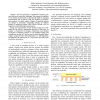Free Online Productivity Tools
i2Speak
i2Symbol
i2OCR
iTex2Img
iWeb2Print
iWeb2Shot
i2Type
iPdf2Split
iPdf2Merge
i2Bopomofo
i2Arabic
i2Style
i2Image
i2PDF
iLatex2Rtf
Sci2ools
CEC
2007
IEEE
2007
IEEE
Design and construction of organic computing systems
Abstract— The next generation of embedded computing systems will have to meet new challenges. The systems are expected to act mainly autonomously, to dynamically adapt to changing environments and to interact with one another if necessary. Such systems are called organic. Organic Computing systems are similar to Autonomic Computing systems. In addition Organic Computing systems often behave life-like and are inspired by nature/biological phenomena. Design and construction of such systems brings new challenges for the software engineering process. In this paper we present a framework for design, construction and analysis of Organic Computing systems. It can facilitate design and construction as well as it can be used to (semi-)formally define organic properties like self-configuration or self-adaptation. We illustrate the framework on a real-world case study from production automation.
Artificial Intelligence | CEC 2007 | Computing Systems | Embedded Computing Systems | Organic Computing Systems |
Related Content
| Added | 02 Jun 2010 |
| Updated | 02 Jun 2010 |
| Type | Conference |
| Year | 2007 |
| Where | CEC |
| Authors | Hella Seebach, Frank Ortmeier, Wolfgang Reif |
Comments (0)

